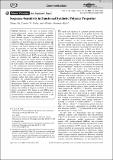Sequence‐Sensitivity in Functional Synthetic Polymer Properties
Author(s)
Jin, Tianyi; Coley, Connor W; Alexander‐Katz, Alfredo
DownloadPublished version (2.157Mb)
Publisher with Creative Commons License
Publisher with Creative Commons License
Creative Commons Attribution
Terms of use
Metadata
Show full item recordAbstract
Recently, a new class of synthetic methyl methacrylate‐based random heteropolymers (MMA‐based RHPs) has displayed protein‐like properties. Their function appears to be insensitive to the precise sequence. Here, through atomistic molecular dynamics simulation, we show that there are universal protein‐like features of MMA‐based RHPs that are insensitive to the sequence, and mostly depend on the overall composition. In particular, we find that MMA‐based RHPs “fold” into globules with heterogeneous hydration patterns. However, the insensitivity to sequence identity observed in MMA‐based RHPs dramatically changes when we substitute the backbone architecture with acrylate or replace the oxygen atom in the side chain with a nitrogen atom (methacrylamide or acrylamide). In such scenarios, the sequence contributes significantly to the compactness and the hydration of monomers. Using principal component analysis and an intersection‐over‐union based index, we demonstrate that different sequences may not overlap in the property space, meaning that their properties are controlled by the sequence rather than fixed composition. We further investigate the sequence‐insensitive capability of the MMA‐based RHPs as previously reported on bacterial phospholipase OmpLA stabilization through heterodimerization. As experimentally observed, such polymers enhance the stability of OmpLA as reliably as its native bilayer environment. The design of such MMA‐based RHPs provides a sequence‐insensitive alternative to protein‐mimetic biomaterials that is orthogonal to the sequence‐structure‐function paradigm of proteins.
Date issued
2025-01-10Department
Massachusetts Institute of Technology. Department of Chemical Engineering; Massachusetts Institute of Technology. Department of Electrical Engineering and Computer Science; Massachusetts Institute of Technology. Department of Materials Science and EngineeringJournal
Angewandte Chemie International Edition
Publisher
Wiley
Citation
T. Jin, C. W. Coley, A. Alexander-Katz, Angew. Chem. Int. Ed. 2025, 64, e202415047.
Version: Final published version